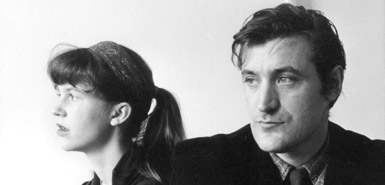Why Does Ted Hughes Get the Last Word on Sylvia Plath?

On October 11th the New Statesman printed a previously unpublished poem by Ted Hughes which discusses the last time he saw his then estranged wife Sylvia Plath alive. While poking around on the internet trying to track down the full text of the poem, I read the comments following a news article which discussed the discovery. The angry author of the post snidely commented that the publication of this new poem should prove once and for all that Hughes was a good guy and vindicate him from the soap-box feminists who condemn Hughes for driving Plath to her suicide.
The Hughes poem, entitled “Last Letter,” describes Hughes running to save Plath after receiving a letter from her implying that she might kill herself. On that day she is still alive, and he leaves relieved. The poem then goes on to describe how Hughes feels torn between Plath and his mistress, then explores what Plath’s last hours might have been like. The poem concludes with a description of Ted Hughes sitting down to work before receiving a call that Plath has died.
Though the poem is heartfelt and mournful, it doesn’t excuse Hughes from whatever role he played in Plath’s death. While Plath suffered from depression before meeting Hughes, I don’t think most people would be cheered if their philandering husbands left them to live with their mistress. However, that’s not really the point. What bothers me more about Hughes and the publication of this poem is the degree to which Plath’s life and work are mediated to us through Hughes and his work.
Though it is not chic to say so, I am a fan of Plath’s poetry. As a confessional poet, it makes sense that Plath’s work often gets conflated with her biography. However, I think her work has a lot more to offer than just a morbid, voyeuristic look into her life with Hughes and her suicide. This new Hughes poem again frames Plath as Hughes’ troubled wife, from Hughes’ point of view. Whatever harm Hughes may have done Plath in life, her oeuvre is done a disservice when she is repeatedly cast not as a dedicated writer, but as someone’s suicidal wife. That is not to say that “Last Letter” is not an interesting discovery for Hughes fans and scholars, but once again, it seems like he gets the last word.
Mushrooms
by Sylvia Plath
Overnight, very
Whitely, discreetly,
Very quietly
Our toes, our noses
Take hold on the loam,
Acquire the air.
Nobody sees us,
Stops us, betrays us;
The small grains make room.
Soft fists insist on
Heaving the needles,
The leafy bedding,
Even the paving.
Our hammers, our rams,
Earless and eyeless,
Perfectly voiceless,
Widen the crannies,
Shoulder through holes. We
Diet on water,
On crumbs of shadow,
Bland-mannered, asking
Little or nothing.
So many of us!
So many of us!
We are shelves, we are
Tables, we are meek,
We are edible,
Nudgers and shovers
In spite of ourselves.
Our kind multiplies:
We shall by morning
Inherit the earth.
Our foot's in the door.
Helen Hajnoczky's work has appeared in Nod, fillingStation, Rampike, and Matrix magazines, as well as in a variety of chapbooks. Her first book of poetry, Poets and Killers: A Life in Advertising, is forthcoming from Snare Books.
(From Lemon Hound.)
Related on maisonneuve.org:
—The Poetry Scene's Insidious Manlove: A Case Study
—High Wire Melodies
—Powerhouse Poetry
Subscribe — Follow Maisy on Twitter — Like Maisy on Facebook





